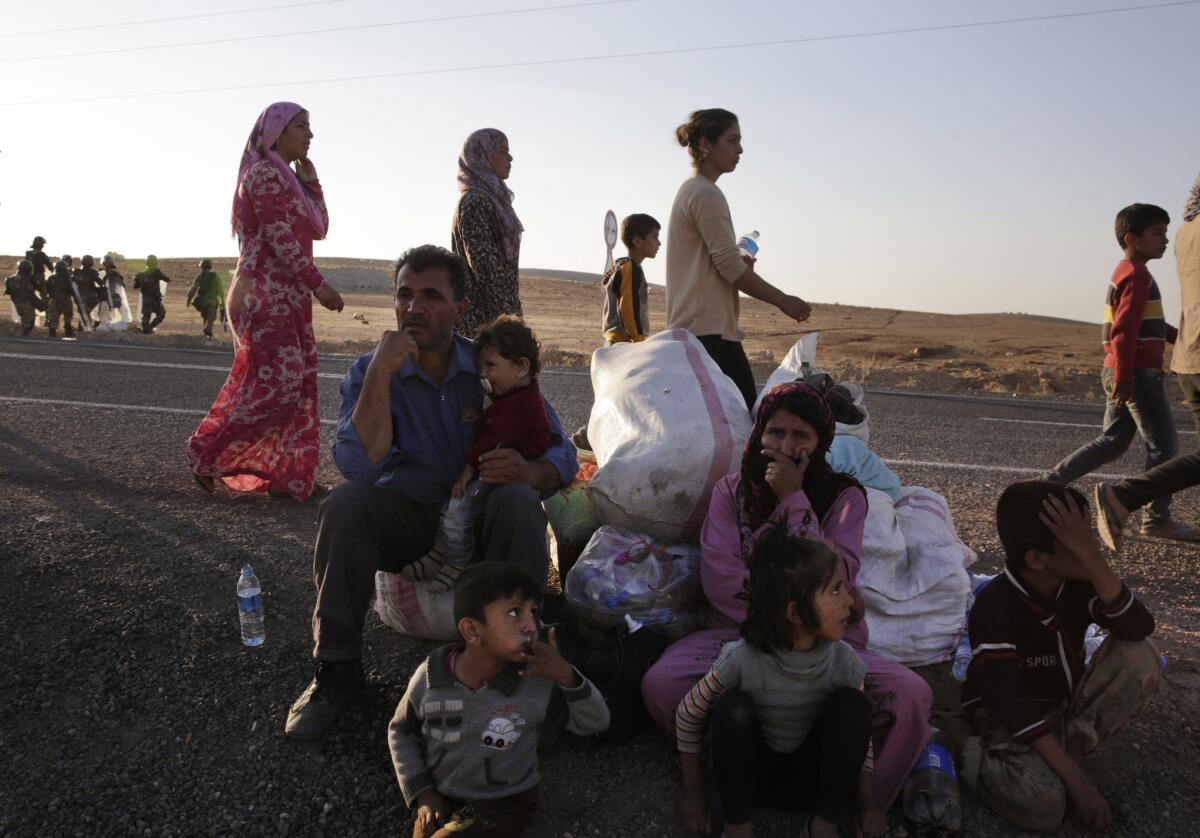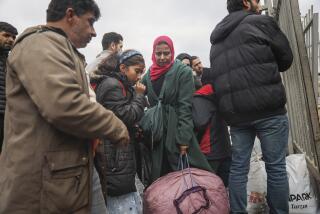Too many sheep? Syrian refugees affect life in southern Turkey

- Share via
Reporting from Gaziantep, Turkey — The Nabi mosque glinted in the noontime glare, a shiny backdrop to shepherds corralling hundreds of sheep in a dirt field here in southeastern Turkey. Families were searching over the weekend for the perfect sheep for Eid al-Adha -- “the feast of the sacrifice” meal to mark the end of the annual Islamic pilgrimage season.
Once selected, the unlucky specimens would be cajoled, carried or dragged to trucks, motorcycle sidecars or even the backseat of cars. But despite the high demand, many of the sheep on market would live to see another day.
“We’re not selling many animals this year, because of Syrian sheep coming in from Kobani,” said shepherd Mahmoud Atchar.
He was referring to the Syrian Kurdish enclave across the Turkish border, the site of intense clashes between militants of the extremist group Islamic State and Syrian Kurdish militiamen.
The hostilities precipitated a mass exodus of mostly Kurds into Turkey. Although many came with only the clothes on their backs, others brought their livestock. That has led to a glut of sheep on the market.
Here in Gaziantep’s Selminiye neighborhood, Atchar had brought his herd of 30-plus sheep to market but had sold only three or four so far.
“Syrian sheep from there are being sold at half the price, so we’re not doing well,” he explained. “I’ll just take the herd home and sell them later.”
The deluge of some 1.5 million refugees into Turkey since the Syrian war began in 2011 has affected life throughout Turkey, but nowhere more so than in its southern region, which shares a 500-mile-plus border with Syria. Cities such as Antakya, Reyhanli and Gaziantep have swollen in size, providing homes to refugees but also experiencing social and economic strains.
Southern Turkey has also become home to de facto rear supply bases for the dizzying number of armed rebel groups arrayed against the government of Syrian President Bashar Assad.
Last week, the Turkish parliament overwhelmingly approved a motion to allow the Turkish military to undertake operations in Syria and Iraq, though it remains unclear if and when the Turks might join the U.S.-led coalition attacking Islamic State fighters there. According to the polling group Metropoll, only 52% of Turkish respondents approved of military intervention.
For many in Gaziantep, however, the action can’t come quickly enough.
“It’s better they attack, because then everyone goes back home and Gaziantep can relax a bit,” said Erfan Chulak, a spice shop owner in the old market in this bustling city of 1.2 million.
Cetin Osmallah, a nearby soda vendor with three sons, agreed.
“My son in the army called me and told me he will plant the Turkish flag in Kobani, and we’ll get rid of the evil of Islamic State and Bashar Assad,” he said.
He also dismissed any threat of a backlash against Turkey by the militants: “We Ottomans don’t joke.... They won’t make it here.”
Syrians who were interviewed, although largely opposed to the U.S.-led airstrikes, nevertheless hope that Turkey can help end their country’s 3 1/2-year-old civil war that has left almost 200,000 people dead.
“Our only concern is to get rid of Islamic State and Bashar. I don’t care whether it’s military, political or airstrikes, whatever the solution, we just want this to end,” said Naasan Mohammad Ramadan, a 44-year-old Syrian who left his village near Aleppo eight months ago after the extremist group took over.
A contractor in his native Syria, he now squeezes a living out of selling cigarettes and phone cards in Gaziantep’s old district.
Was he not worried of reprisals against Syrians if a car bomb blew up in Gaziantep or if the extremists of Islamic State, also commonly referred to as ISIS, beheaded a Turkish soldier?
“No matters what happens here,” Ramadan replied, “it won’t compare to ISIS and the regime.”
Bulos is a special correspondent.
More to Read
Sign up for Essential California
The most important California stories and recommendations in your inbox every morning.
You may occasionally receive promotional content from the Los Angeles Times.











